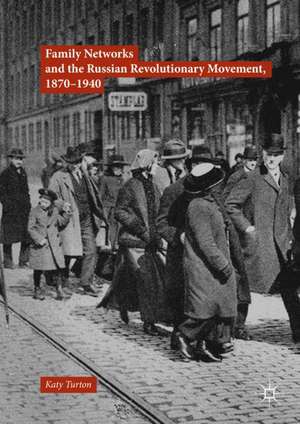Family Networks and the Russian Revolutionary Movement, 1870–1940
Autor Katy Turtonen Limba Engleză Hardback – 14 dec 2017
Preț: 643.00 lei
Preț vechi: 756.47 lei
-15% Nou
Puncte Express: 965
Preț estimativ în valută:
123.04€ • 126.93$ • 102.68£
123.04€ • 126.93$ • 102.68£
Carte tipărită la comandă
Livrare economică 27 martie-10 aprilie
Preluare comenzi: 021 569.72.76
Specificații
ISBN-13: 9780230393073
ISBN-10: 0230393071
Pagini: 261
Ilustrații: XX, 261 p.
Dimensiuni: 148 x 210 mm
Greutate: 0.49 kg
Ediția:1st ed. 2018
Editura: Palgrave Macmillan UK
Colecția Palgrave Macmillan
Locul publicării:London, United Kingdom
ISBN-10: 0230393071
Pagini: 261
Ilustrații: XX, 261 p.
Dimensiuni: 148 x 210 mm
Greutate: 0.49 kg
Ediția:1st ed. 2018
Editura: Palgrave Macmillan UK
Colecția Palgrave Macmillan
Locul publicării:London, United Kingdom
Cuprins
Chapter 1 Introduction.- Chapter 2 Joining the Movement.- Chapter 3 The Underground.- Chapter 4 Prison.- Chapter 5 Exile.- Chapter 6 Families after 1917.- Chapter 7 Opposition after 1917.- Chapter 8 Conclusion.
Notă biografică
Katy Turton is a historian of the Russian revolutionary movement, with a particular interest in the role of women. She has worked as a lecturer at the University of York, UK, and Queen’s University, Belfast, Ireland, and is the author of Forgotten Lives: The Role of Lenin’s Sisters in the Russian Revolutionary Movement.
Textul de pe ultima copertă
This book explores the role played by families in the Russian revolutionary movement and the first decades of the Soviet regime. While revolutionaries were expected to sever all family ties or at the very least put political concerns before personal ones, in practice this was rarely achieved. In the underground, revolutionaries of all stripes, from populists to social-democrats, relied on siblings, spouses, children and parents to help them conduct party tasks, with the appearance of domesticity regularly thwarting police interference. Family networks were also vital when the worst happened and revolutionaries were imprisoned or exiled. After the revolution, these family networks continued to function in the building of the new Soviet regime and amongst the socialist opponents who tried to resist the Bolsheviks. As the Party persecuted its socialist enemies and eventually turned on threats perceived within its ranks, it deliberately included the spouses and relatives of its opponents in an attempt to destroy family networks for good.
Caracteristici
Examines the place and role of the family in the revolutionary movement in Russia Builds upon the work of the author's previous book Forgotten Lives:The Role of Lenin's Sisters in the Russian Revolution, 1864-1937 Explores the persistent inequality of the sexes found in the revolutionary parties before and after the revolution Includes supplementary material: sn.pub/extras
